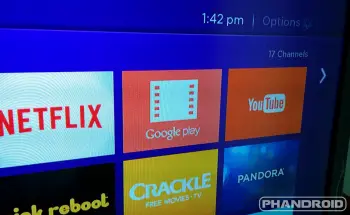
Google Play might soon disclose whether an app shares your data with third-parties
Yesterday, Google announced that they’d started employing a new app review process to help keep the spoiled apps out of Google Play. They’d also started issuing a questionnaire for developers to fill out about any and every app they have on Google Play.
The purpose of this questionnaire is for Google to be able to determine what sort of age-restricted rating to issue it in each region the app is available (which is mostly necessary to make sure regulatory bodies in a certain country won’t block access to your app).
You fill it out, and Google will spit back a rating appropriate for each major content ratings board that exists. You’ll see the ratings Phandroid’s app received in the screenshot straight ahead:
The questionnaire asks a few interesting questions of developers. Most of it pertains to the presence of violence, sexual content and general social interactions that could be inappropriate for youngsters, but a “miscellaneous” section in the questionnaire asks developers to disclose a couple of other interesting details:
- Whether your app shares personal information with third-parties (with personal information being defined as your name, address, email address, phone number, date of birth, national insurance number, financial information and other private records)
- Whether your app shares your location data with other users or third-party apps (for example, showing your location on a publicly-viewable map or being able to post your coordinates or a link to a map with your location on a social network, but not necessarily using your location within the confines of the app to enhance its functionality)
This raises a very interesting question: will this information eventually be listed in Google Play? Google doesn’t spell it out, but it sounds like they might eventually require this information to be transparent before a user even downloads the app in Google Play. Google has already long shown information about in-app purchases in an app’s Play Store listing ahead of downloading it, and that question also exists on the very same questionnaire.
So how would Google communicate the information to a user if they opt to show it? It’s likely any mentions of the presence of these elements would go in the same window that shows you what permissions the app has (such as whether it can access your contacts or use internet data) before downloading it to your phone or tablet.
Another point to consider is the factor of honesty: what’s stopping a developer from simply lying on the questionnaire? It’s easy to bust a developer who says their app doesn’t have any violence and then find out there’s a murder scene in the opening credits of a game, but what happens about stuff that isn’t visibly represented on the surface of the app?
While most top developers tend to be honest, open and upfront about how they use your data (you’ll often find that information in an app’s terms of use if you’ve ever bothered to read them), there’s always the chance that a devious coder — or someone who simply doesn’t know any better — could be manipulating and sharing your data behind the scenes.
Perhaps it’s something to be worked out by Google and their new review process, and perhaps it’s something their cerberus-like app scanning engine can already detect. There’s not enough information in the open to know for sure, but we aim to find out how Google plans to approach that issue and will certainly look to share any response we get.
In the meantime, be sure to take a look at a few screens from the questionnaire process above to get an idea of the sort of details developers have to disclose to make sure their apps are appropriately rated for global distribution.